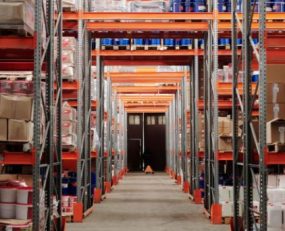
The idea of on-demand warehousing has been creating somewhat of a buzz in the logistics industry in recent years, challenging the traditional models of long-term 3PL contracts and in-house fulfilment. Ti spoke to two professionals of the industry, EV cargo’s Head of On Demand warehousing platform Xavier Archbold and Non-Executive Director (NED) of Warehouse-Space.co.uk Mike Daly, to find out more. EV Cargo’s on-demand warehousing platform provides a fully managed service which deals with warehouse operators on the shipper’s behalf, offering both localised, customer-centric storage solutions as well as upstream processing and devanning. EV Cargo’s on demand services operate through its VisiStore platform which looks to provide the ability to view storage across several different 3PLs. Warehouse-Space.co.uk meanwhile connects shippers with warehouse operates through a brokerage model, allowing shippers to deal directly with the warehouses of their choice. Shippers can make an enquiry through the company’s website to discuss requirements in more depth.
On-demand warehousing is a broad term, covering both brokerage services as well as managed flexible logistics. Ultimately, the term refers to the ability to access warehousing services as and when required without the need for long term commitment. The process has been touted as a key tool in how the shared economy is going to impact logistics and has been creating a buzz in the logistics industry in recent years by challenging traditional models of long-term 3PL contracts and in-house fulfilment.
According to Mike Daly, NED of Warehouse-Space.co.uk, the on-demand space is increasingly being viewed as a matured market, driven by Brexit stockpiling and Covid disruptions. He stated that “it’s definitely becoming an increasingly accepted practice to utilise a broker such as Warehouse-Space.co.uk” as warehouse keepers struggle to effectively utilise space. Daly also pointed that he has seen “several companies restrict the number of salespeople they might hire because it makes more financial sense to utilise an on-demand warehousing service. If warehouse owners can’t fill their underutilised space themselves, it’s better to sell the space via a broker like Warehouse-Space.co.uk and pay a small finder’s fee than miss out on an extra stream of revenue.”
But just what are the advantages of using such a system for shippers? According to head of EV Cargo’s on-demand warehousing platform Xavier Archbold, “there are often issues in the supply chain where a provider somewhere along the value chain has a challenge and needs support to cost effectively overcome said challenges. An example would be where containers are stuck at port because there’s no warehousing available and/or no container capacity to move to the warehouse. This is where on-demand warehousing comes in, which can provide solutions quickly and on a short-term basis when things go wrong. When you go to more traditional 3PLs for a short-term contract, you’ll be limited to their network and locations. The advantages of going to an on-demand specialist such as EV Cargo therefore is that we have so many partners within our network, all seamlessly linked by our transport operations, which allow us to optimise our provisions geographically as well as for customer specific requirements. As we already have relationships with our partners, we can also move fast to maximise the benefit to the customer” He continued: “[our platform] works very well for warehousing partners, as well as our customers. It’s our knowledge that links the two together, making sure it’s the right partner, right place, and right overall cost.”
Furthermore, Daly argues that there’s “no disadvantage for shippers. Although it’s quite easy for shippers to do a Google search and find some warehouses, it’s much more preferable to utilise a warehouse provider that’s been recommended to you by a specialist company like Warehouse-Space.co.uk. Shippers in particular have nothing to lose as we never charge the enquirer a fee.”
Perhaps most interestingly, those in the on-demand warehousing space have a unique viewpoint of both the supply and demand sides of warehousing by working with both owners and prospective occupiers. When asked about the future of on-demand warehousing, Daly highlighted that he believes due to huge amounts of warehouse construction and overcapacity, supply is going to increasingly outweigh demand in the coming year. Daly also believes that owners will have to offer increasingly attractive entry points to fill large construction projects which are yet to be completed.
Similarly, Archbold highlighted that there are now many non-3PL providers, such as grocers or retailers, with excess warehousing space who would benefit from partnering with an experienced 3PL and on-demand warehousing specialist such as EV Cargo to support with both finding users for their space and providing 3PL transport services.
As the logistics industry continues to navigate its way through challenging economic conditions, it will be interesting to see how the on-demand warehousing space develops.
Supply chain strategists can use GSCi – Ti’s online data platform – to identify opportunities for growth, support strategic decisions, help them stay abreast of industry trends and development, as well as understand future impacts on the industry.
Visit GSCI subscription to sign up today or contact Michael Clover for a free demonstration: [email protected] | +44 (0) 1666 519907
Source: Transport Intelligence, 25th May 2023
Author: Nia Hudson